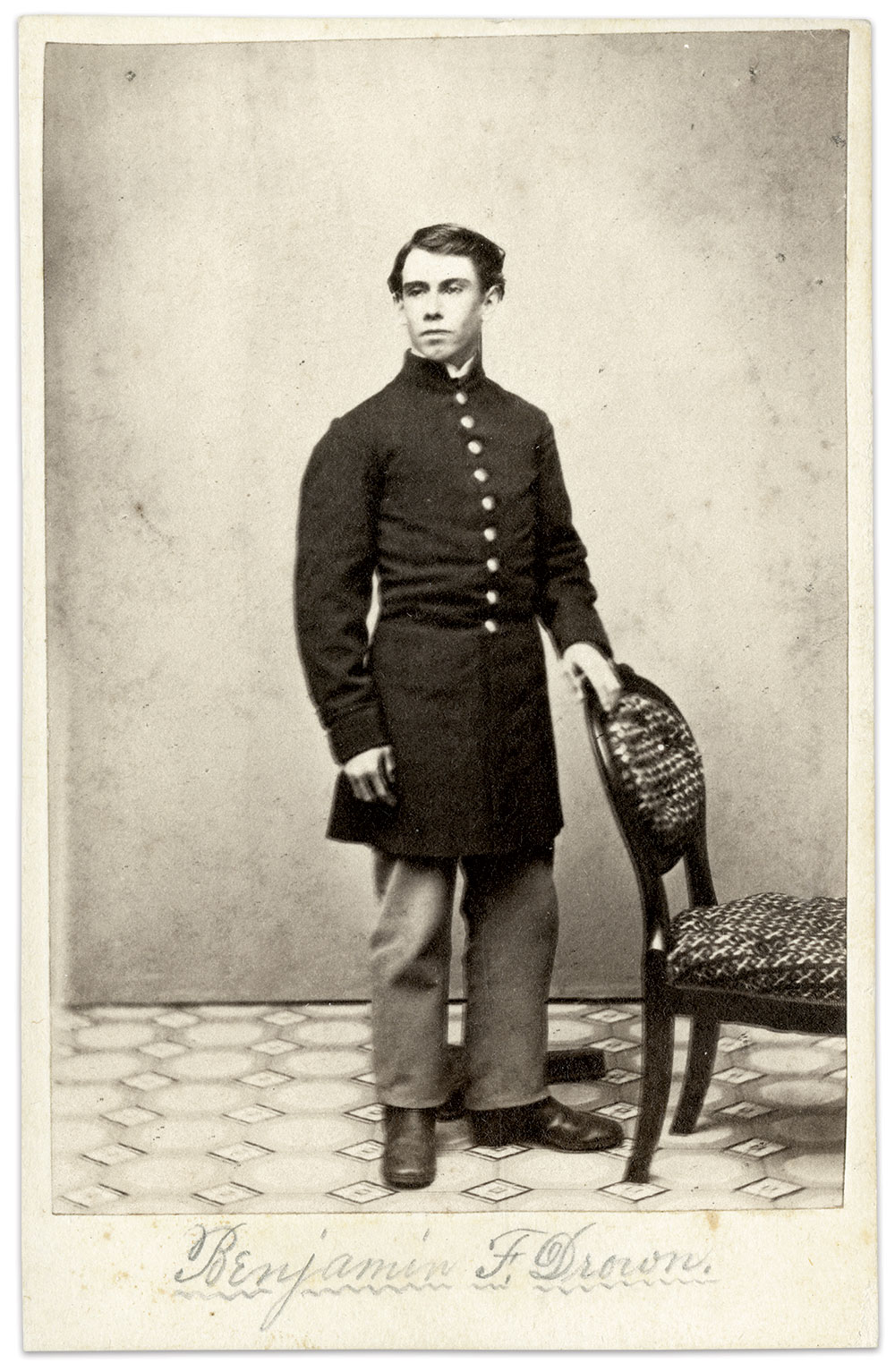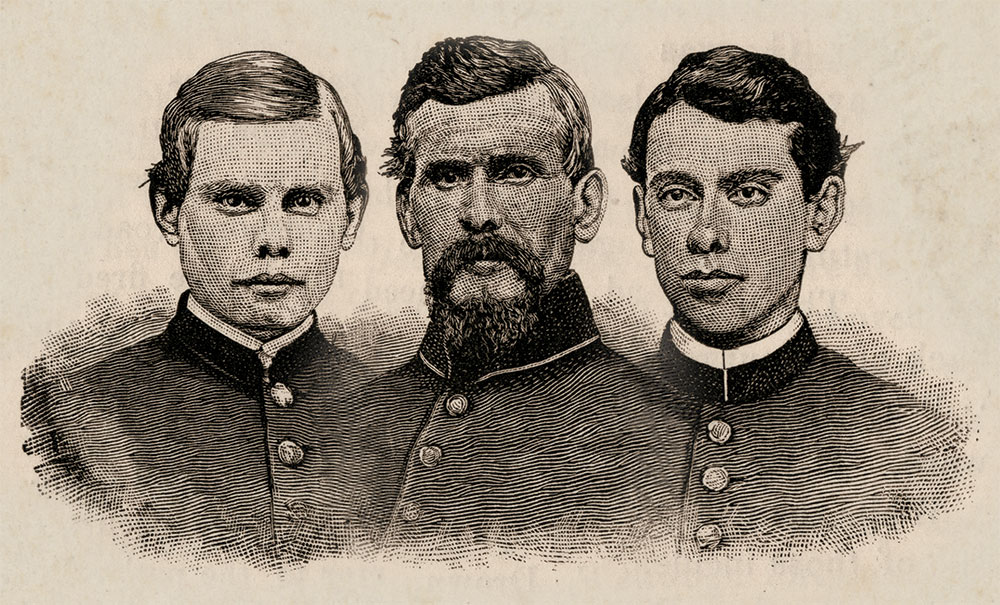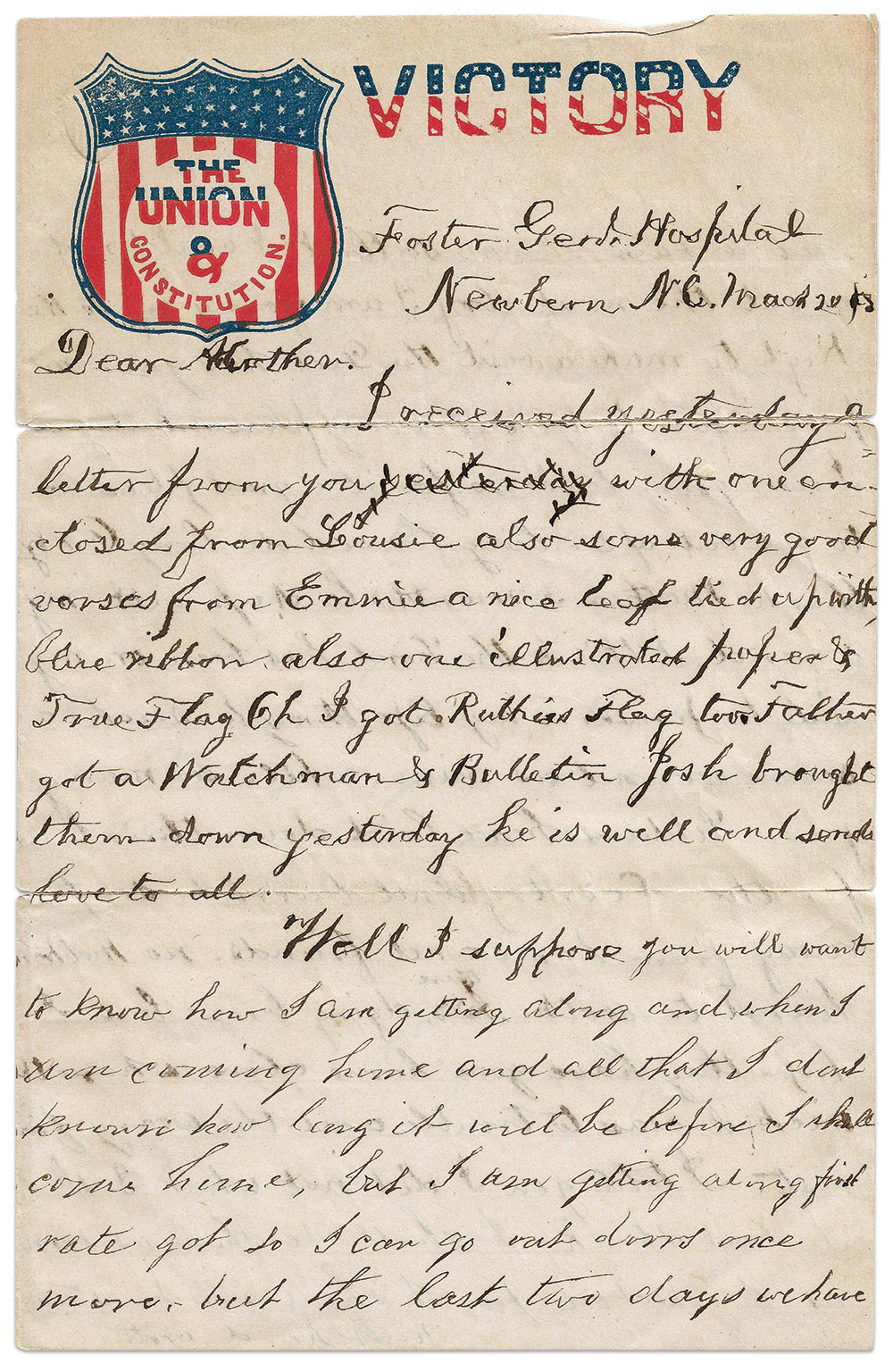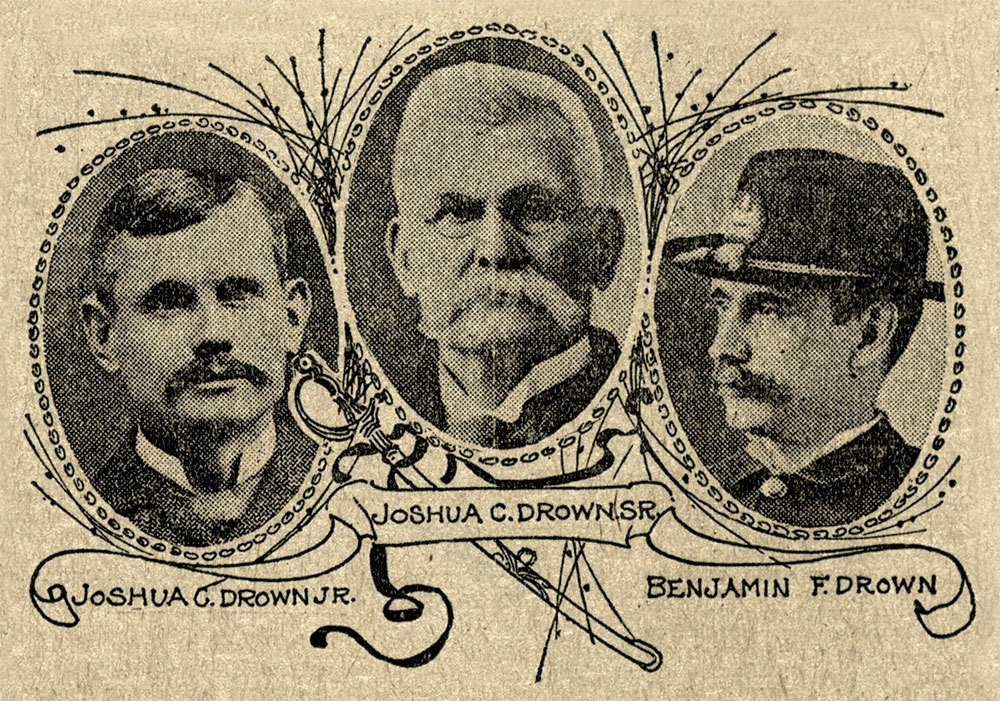By Norman C. Delaney
When veteran John K. Burlingame compiled a history of the 5th Rhode Island Heavy Artillery, he devoted a full page to portraits of three comrades. “The Drown Group” included engravings of Joshua Champlin Drown and his two sons, Benjamin Franklin and Joshua, Jr.
Although members of the same family serving together were common in the Union and Confederate armies, a father and his sons were nevertheless noteworthy. Burlingame chose to ignore another unusual family group in the regiment—Kady McKenzie Brownell, who had fought by the side of her husband, Sgt. Robert Brownell. She served as the flag bearer of the 5th during the Battle of New Bern, where Robert suffered a serious leg wound. Kady then relinquished her position to care for her husband and other wounded soldiers.

Surviving letters by Benjamin and other records shed light on the service of the Drowns.
At the start of the war, the Drowns worked in different occupations in Warren, R.I. Joshua, Sr., a skilled carpenter, took on jobs as a housewright, or a builder and repairer of houses. Benjamin clerked in the dry goods establishment of Thomas G. Turner, a former governor of Rhode Island, and Joshua, Jr., labored as a farmer.
On Nov. 4, 1861, Benjamin, 18, enlisted in the 5th Rhode Island Infantry (it would convert to heavy artillery in 1863) and received an assignment to Company C. His younger brother, 16-year-old Joshua, joined him in the same company six weeks later. Both boys received promotions to corporal in June 1862.
Joshua, Sr., 41, eager to enter the fray, followed his sons into the regiment in August 1862. He received an assignment to Company C.
The elder Drown had taken up arms before. Twenty years earlier, he had participated in Dorr’s Rebellion, an attempt by armed Rhode Island radicals to force state legislators to broaden voter eligibility.
What did Benjamin think of his father enlisting? In a letter to his mother, Malvina, he wrote, “It almost made me cry when I saw that Father had enlisted. I am so glad he is so patriotic but I think after sending two sons into the field, he might have stayed at home and let it rest at that. I should like to see him first rate.”


During 1862, the 5th participated in several engagements in North Carolina—Roanoke Island, New Bern, Fort Macon, Kinston and Whitehall. At the last-named action, fought on December 16, a musket ball passed through the right shoulder of Benjamin, who had replaced Kady Brownell as the brigade’s flag bearer. Benjamin believed an enemy sharpshooter firing from a tree had targeted him. The attending surgeon, Edward P. Morong of the Union 2nd Maryland Infantry, observed, “the missile passed through the head and neck of the right humorous fracturing the tuberosity.” Four inches of bone were sawed out of Benjamin’s shoulder and eleven pieces of fractured bone removed. While convalescing at Foster Hospital in New Bern, he received frequent visits from his father, brother, and a close friend from Warren, Walter Luther, who was now a lieutenant in Company D.
In a letter dated Feb. 2, 1863, Luther apprised Malvina Drown of her husband and sons. Benjamin—“Bennie”—he found to be “in the best of spirits.”

Luther continued, “Major [George W.] Tew of our Regt and our Chaplain [Henry S. White] are very much interested in Bennie and call him a noble fellow. The Major is very anxious that his wound get well quick for he should have a commission immediately. Josh and Bennie are both noble boys and I and no one else has heard Bennie utter a single complaint. After I returned from the Hospital and while talking with Major Tew and our Col. [Henry Sisson] I saw the Major pointing to Josh [saying] ‘There’s a smart fellow, see how neat and clean he looks. He is brother to Cpl. Drown in the hospital; his case ought to be attended to.’ ‘Yes,’ says the Col. I am going to attend to him.’ I never saw Josh or Bennie when they did not look clean and neat. I do not think that the climate agrees with Mr. Drown. I think that he ought to get his discharge. He told me that he knew it did not. His captain is going to try to get his discharge for him. I did speak to Lt. Col. [Job] Arnold and if he uses his influence he will get it.”
When Luther next wrote Malvina six weeks later, Joshua, Jr., had advanced to sergeant and transferred to his father’s Company A, while Benjamin remained in the hospital. Luther pulled strings at headquarters to have Joshua, Sr., discharged.
Meanwhile, the elder Drown’s health continued to fail. He spent three consecutive months in the hospital during the first half of 1863, and received a disability discharge in July.
The discharge may have saved his life. Less than a year later, on May 5, 1864, Confederates captured Company A—52 men along with Chaplain White—at Croatan, an outpost 12 miles outside New Bern. Joshua, Jr., was not among them, for he had left the company with another promotion as the regiment’s sergeant major.
The prisoners were brought to notorious Andersonville Prison in Georgia. An April 1865 report included in the regimental history listed 33 dead and six more supposed dead as a result of their captivity.
Benjamin eventually returned to duty at New Bern and received a second lieutenant’s commission in April 1864. Nine months later, on Dec. 23, 1864, he and Joshua, Jr., mustered out with the rest of the regiment.

Benjamin never recovered the use of his right arm and received a government pension to compensate him for his injury. The handicap did not prevent him from full-time employment as a cashier at Jordan Marsh Company in Boston, later the Russell Paper Company, and still later the Boston Municipal Water Department, where he worked until his retirement in 1911. When his wife, the former Anna Hewins of New Bedford, Mass., died in 1880, Benjamin married her sister, Lucy. Benjamin died on Aug. 15, 1913, at about age 69. His remains rest in New Bedford’s Rural Cemetery.
He had outlived his father by eight years. Joshua, Sr., died in 1907 from a heart attack while engaged in carpentry work. He was 86.
Joshua, Jr., the exemplary soldier, married Jane Burnside and further distinguished himself as a member of the Rhode Island Militia while employed as a bookkeeper. This last member of “The Drown Group” died in 1920 at age 74.
References: B. F. Drown letters, author’s collection; Drown military service records at the Rhode Island Historical Society; History of the Fifth Regiment Rhode Island Heavy Artillery, during Three Years and a Half of Service in North Carolina January 1862–June 1865; Annual Report of the Adjutant General for the Year 1865; “Descriptive Book of the Fifth Regiment Rhode Island Volunteers”; Representative Men and Old Families of Rhode Island, Vols. 1 and 2; Rhode Island State Census, 1865; Index to Vital Records of Rhode Island: Births, Marriages and Deaths; Boston Daily Globe; Providence Journal; The Medical & Surgical History of the War of the Rebellion.
Norman C. Delaney, PhD, is an authority on Civil War naval history. His John McIntosh Kell of the Raider Alabama won the Baruch Award of the United Daughters of the Confederacy. In 2010 he was chosen Author of the Year by the U.S. Naval Institute for articles on the Kearsarge and Alabama in Naval History magazine.
SPREAD THE WORD: We encourage you to share this story on social media and elsewhere to educate and raise awareness. If you wish to use any image on this page for another purpose, please request permission.
LEARN MORE about Military Images, America’s only magazine dedicated to showcasing, interpreting and preserving Civil War portrait photography.
VISIT OUR STORE to subscribe, renew a subscription, and more.

